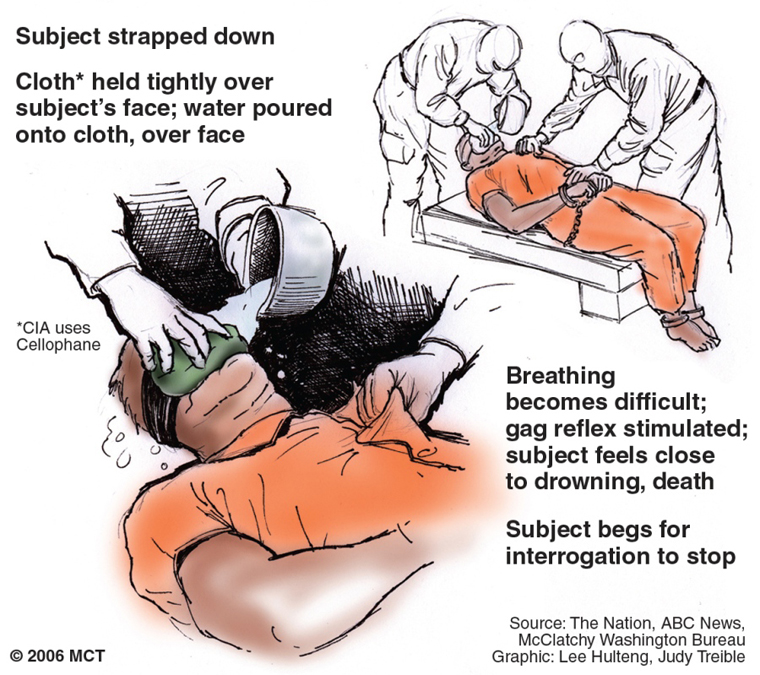
Slowly but surely the “torture” debate inches closer to full disclosure and accountability. In what is most assuredly one of the darkest chapters in modern American history, our immoral use of torture to wrest “confessions and information” from “enemy combatants” and other suspects held in Guantanamo and foreign countries is finally coming to light.
In documents released by the President Obama’s administration, details of our torture program that were otherwise unclear have become much more discernable. Even The New York Times, which along with the rest of the mainstream media has mistakenly called waterboarding “simulated drowning” has recently changed its terminology and now calls it “near drowning.” Near suffocation is even more accurate, because that is what near drowning is; the deprivation of air due to the inhalation of water to the point of deliriousness and near-death.
I objected to the term “simulated drowning” in an article published in the Sun well over a year ago, calling it inaccurate, misleading and downright deceptive. “Near drowning” comes much closer, as it sharpens one’s understanding of exactly what is happening in this particular suffocation event. Try holding your breath beyond what feels comfortable, and then hold it for ten seconds more – feel your sense of urgency and panic rise. Hold your breath ten seconds more. These feelings are mild when compared with the sensation of drowning.
Upon learning that one captive was subjected to this torture 83 times in one month is stunning news. Clearly this was not for the purpose of gaining intelligence or information; rather, this was cruel and unusual punishment, pure and simple.
There are those, like former Vice-President Dick Cheney, who argue that valuable information was revealed using torture, and we should not be so quick to condemn tactics like these. Only a man who has never served in the armed forces could make such a stupid comment. By rejecting the Geneva Accords dealing with the treatment of prisoners, the past administration gave the green light to other nations that torture. Such comments are more than ironic given the explicit statement by former President George W. Bush that “America does not torture.” Sadly, we have placed ourselves in the company of the dark forces we ostensibly oppose. Through Cheney’s upside-down logic we become the very monster we abhor.
The current debate about bringing to justice the people who authorized torture has divided our nation yet again. President Obama seems to believe that such inquiry and prosecution will be too hurtful to America. Many Republican leaders staunchly defend the past administration, while condemning torture. Some Democrats prefer prosecutions in an effort to prove America is a land of justice and law. A “Truth” commission with no prosecutorial power has been proposed and rejected.
At the same time, a new batch of photographs showing the gross mistreatment of American-held prisoners will inevitably come to light. This will undoubtedly be shocking and disturbing, and serve to fuel the torture debate even more. At least everyone is on the same page now; no one denies that America tortured. We must honestly come to terms with that uncomfortable fact; it won’t be easy or fun, and not at all entertaining. Like any society that honestly examines and admits to its failures, it may serve, however, to better our nation in the end.